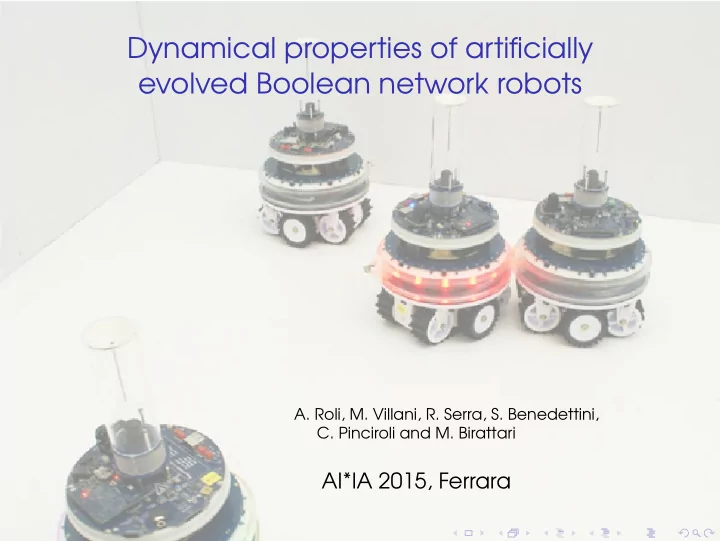

Dynamical properties of artificially evolved Boolean network robots A. Roli, M. Villani, R. Serra, S. Benedettini, C. Pinciroli and M. Birattari AI*IA 2015, Ferrara
Gene5 Gene2 Gene4 Gene regulatory models Gene1 Gene6 Gene3 Gene8 Gene7 ● ● ● ● ● ● ● ● ● ● ● ● ● ● ● ● ● ● ● ● ● ● ● ● ● ● ● ● ● ● ● ● ● ● ● ● ● ● ● ● ● ● ● ● ● ● ● ● ● ● ● ● ● ● ● ● ● ● ● ● ● ● ● ● ● ● ● ● ● ● ● ● ● ● ● ● ● ● ● ● ● ● ● ● ● ● ● ● ● ● ● ● ● ● ● ● ● ● ● ● ● ● ● ● ● ● ● ● ● ● ● ● ● ● ● ● ● ● ● ● ● ● ● ● ● ● ● ● ● ● ● ● ● ● ● ● ● ● ● ● ● ● ● ● ● ● ● ● ● ● ● ● ● ● ● ● ● ● ● ● ● ● ● ● ● ● ● ● ● ● ● ● ● ● ● ● ● ● ● ● ● ● ● ● ● ● ● ● ● ● ● ● ● ● ● ● ● ● ● ● ● ● ● ● ● ● ● ● ● ● ● ● ● ● ● ● ● ● ● ● ● ● ● ● ● ● ● ● ● ● ● ● ● ● ● ● ● ● ● ● ● ● ● ● ● ● ● ● ● ● ● ● ● ● ● ●
Boolean network robotics input nodes ��� ��� ��� ��� ��� ��� ��� ��� ��� ��� ��� ��� ��� ��� ��� ��� ��� ��� ��� ��� ��� ��� ��� ��� input output ��� ��� ��� ��� encoding encoding ��� ��� ��� ��� ��� ��� output nodes actuators sensors Boolean network
Boolean network robotics Automatic design of robot controllers target Boolean simulation evaluator requirements Network objective function value network model metaheuristic (structure and Boolean functions)
The task Design process: Adaptive walk in the space of Boolean functions Incremental training : first phototaxis, then composite task
Analysis of BN-robot dynamics BN trajectory states statistics Information theory measures
Results BN-robots optimally balancing robustness and evolvability show generalisation and high statistical complexity
Recommend
More recommend